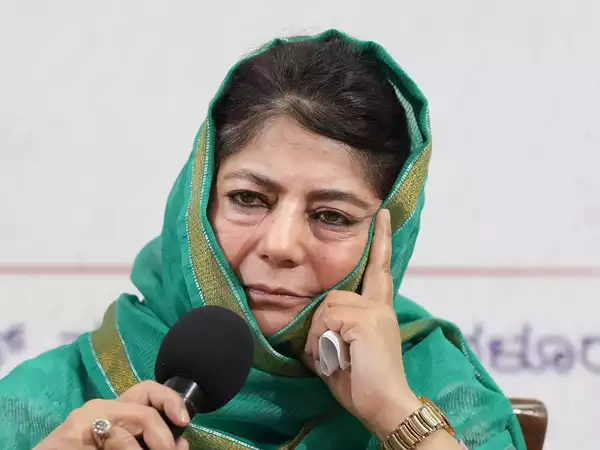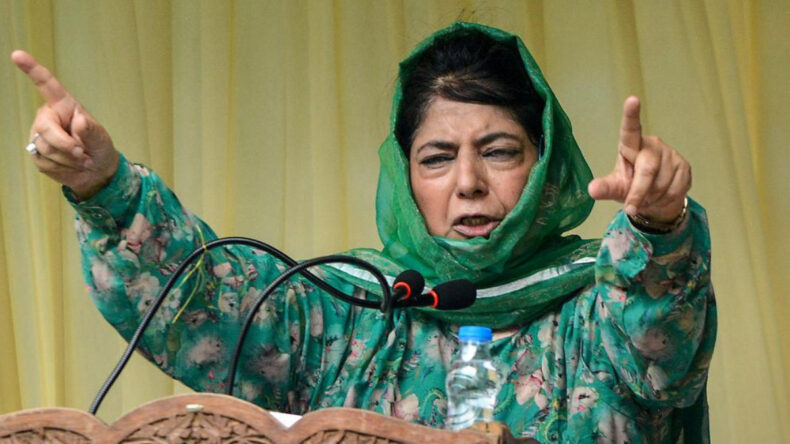
Former Chief Minister and President of the People’s Democratic Party (PDP), Mehbooba Mufti, has called for a unified front to thwart the Bharatiya Janata Party (BJP) in Jammu and Kashmir. During the party’s 24th Foundation Day address, Mufti emphasized the need for solidarity among different religious and ethnic groups, stating that a united front of Shia, Sunni, Hindu, Muslim, Sikh, Christian, Bodh, Gujjar, Bakerwal, and Pahari communities would compel the BJP to concede defeat.
Recalling her father Mufti Mohammad Sayeed’s political stance in 2015, Mehbooba revealed that he had insisted on assurances from Prime Minister Narendra Modi to protect Article 370 of the Constitution during the government formation in Jammu and Kashmir. She asserted that Mufti’s intentions were not merely focused on obtaining power but aimed to safeguard the state’s special status and interests.
However, Mehbooba lamented that the BJP had failed to uphold its commitments and instead exerted pressure on the people of Jammu and Kashmir, leading to a sense of subjugation. Expressing disappointment at the current situation, she questioned the BJP’s achievements in the region, comparing it to the era of Pandit Jawaharlal Nehru when the tricolour was hoisted in Lal Chowk amid a different atmosphere of unity and harmony.
Mehbooba highlighted the progress made during her father’s first term as Chief Minister, including significant developments in both reconciliation and infrastructure projects. She pointed out that the dialogue between Hurriyat and Advani and the reopening of the road between Srinagar and Muzaffarabad were crucial milestones achieved during that time.
Mehbooba Mufti expressed deep apprehension about the repeated raids carried out by security agencies such as the Enforcement Directorate (ED), the National Investigation Agency (NIA), the State Intelligence Agency (SIA), and the Special Investigation Unit (SIU) in the region. She raised serious concerns over the motives behind these operations and urged the Supreme Court to thoroughly investigate the reasons and necessity behind such actions.
The former Chief Minister specifically highlighted the plight of Kashmiri youth who were subjected to detention under the stringent Public Safety Act (PSA) without being provided with fair and proper trials. This practice has raised significant questions about the lack of due process and justice for incarcerated individuals. Mehbooba vehemently criticized the authorities for resorting to such measures, emphasizing the importance of respecting the rights of the accused and ensuring a transparent and just legal system.
Another alarming aspect that she brought to attention was the plight of the parents whose children were detained under the PSA. According to Mehbooba, these parents were being denied the fundamental right to meet and be with their detained children.
Accusing the BJP of trying to transform the entire country into Manipur, she urged opposition parties to unite and counter these alleged attempts. She called for a return to the policy of former Prime Minister Atal Bihari Vajpayee, which she deemed more conducive to achieving peace.
Further criticizing the UT administration, she questioned the nomination of migrants from Kashmir to the Jammu and Kashmir Assembly, urging the allocation of seats to the community instead.
Highlighting her father’s willingness to engage in dialogue with separatists during his tenure as Home Minister, Mehbooba expressed regret that the opportunity was not seized. She noted that armed conflict had not resolved the issues and had only resulted in continued suffering for the people.
Mehbooba also brought attention to the absence of reservations for Sikhs in the Jammu and Kashmir Assembly, arguing that such reservations could promote inclusivity and deter communal politics.
Mehbooba emphasized that her party, the PDP, was not a problem but rather a potential solution to the Kashmir issue. She underscored the importance of seeking resolutions within the democratic framework and called for unity and cooperation among political parties to address the challenges faced by the region.













